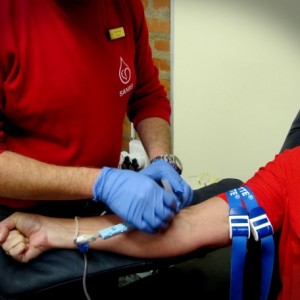 WASHINGTON — The Food and Drug Administration (FDA) is reconsidering its current ban on allowing homosexual men who have been sexually active within the past year to donate blood.
WASHINGTON — The Food and Drug Administration (FDA) is reconsidering its current ban on allowing homosexual men who have been sexually active within the past year to donate blood.
On Tuesday, the FDA announced that it was opening up a public comment period about the issue, advising that it is considering switching from a time-based policy to a personal risk-based assessment.
“The Food and Drug Administration (FDA or Agency) is establishing a public docket for comment on the Agency’s blood donor deferral recommendations for reducing the risk of human immunodeficiency virus (HIV) transmission,” the notice issued by the administration outlines.
“Interested persons are invited to submit comments, supported by scientific evidence such as data from research, regarding potential blood donor deferral policy options to reduce the risk of HIV transmission, including the feasibility of moving from the existing time-based deferrals related to risk behaviors to alternate deferral options, such as the use of individual risk assessments,” it continues.
Dr. Peter Marks, director of the FDA’s Center for Biologics Evaluation and Research, told reporters that feedback may influence the direction of the administration’s policy on blood donation.
“The FDA will carefully consider all of the information submitted as it determines the appropriate next steps, and we will continue to review the agency’s donor deferral policies to ensure they reflect the most up-to-date scientific knowledge,” he said. “We are committed to obtaining the needed scientific evidence to move to alternative donor assessment strategies in the future.”
As previously reported, the FDA first announced in 2014 its intent to loosen its restrictions on blood donations from homosexual men, stating that it would “take the necessary steps to recommend a change to the blood donor deferral period for men who have sex with men from indefinite deferral to one year since the last sexual contact.”
Last December, it issued its final guidance on the matter, advising that it compared its policies with current scientific evidence surrounding HIV transmission, as well policy changes implemented by other countries.
“Ultimately, the 12-month deferral window is supported by the best available scientific evidence, at this point in time, relevant to the U.S. population,” Mark stated at the time. “We will continue to actively conduct research in this area and further revise our policies as new data emerge.”
The FDA first enacted its policy in 1983 during the height of the AIDS crisis. Some have decried the ban as being discriminatory toward homosexuals while others believe that it is necessary to protect public health.
“There are several highly disturbing aspects to this politically-motivated change in the United States’ blood donation policy,” Peter LaBarbera, president Americans for Truth About Homosexuality, told reporters in December. “First of all, homosexual activists frame this entire issue in terms of so-called ‘anti-gay discrimination’ and equality, instead of prioritizing above all the safety of the American blood supply.”
“Secondly,” the FDA’s report shows that a small percentage of homosexual men have ignored the blood donation ban,” he continued. “Now we are going to trust practicing homosexuals with an even looser regulation?”
Become a Christian News Network Supporter...


